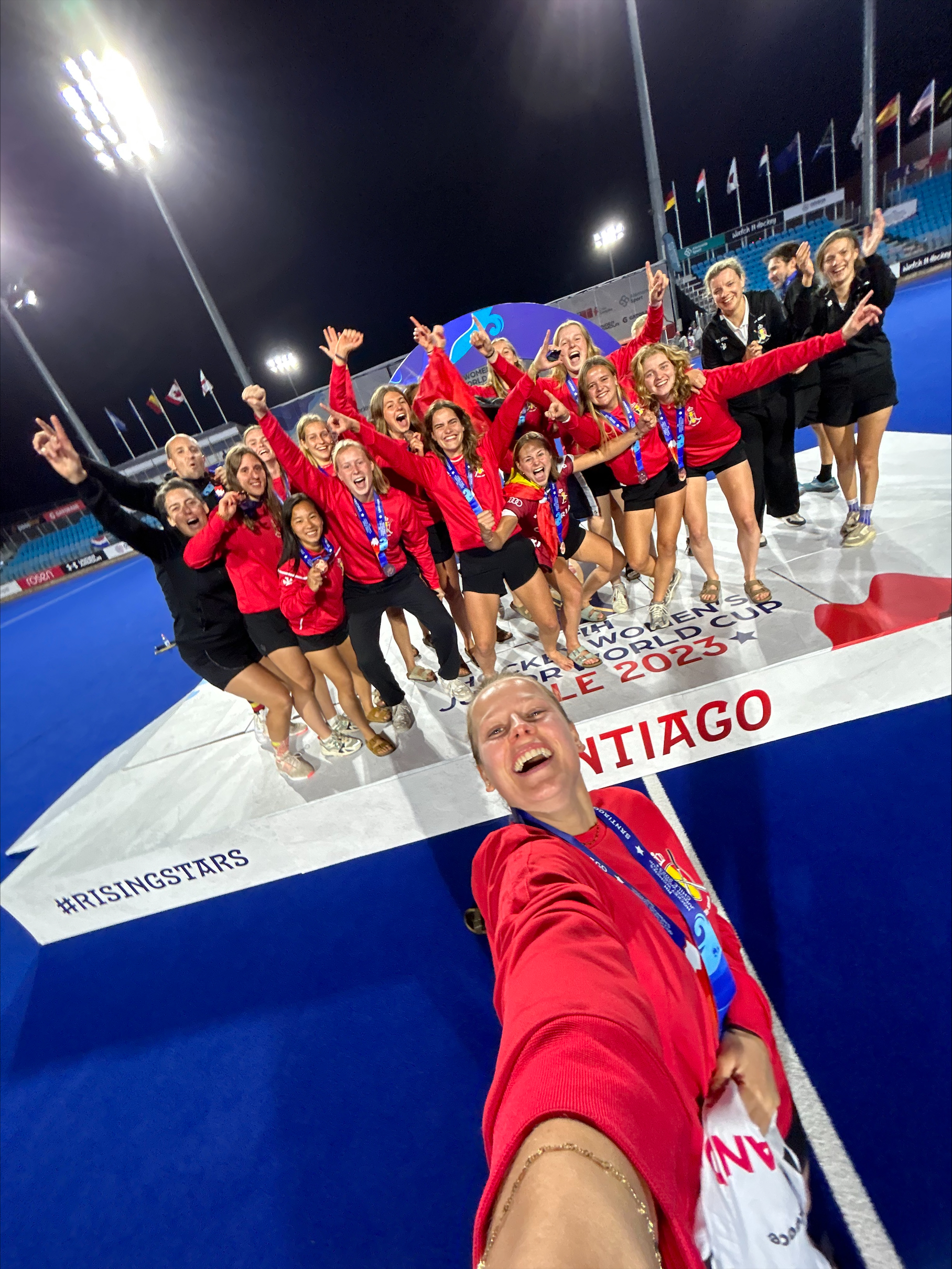Dans la même rubrique
-
Partager cette page
Campus standouts - Eva Goffinet
This month, we’re delighted to introduce Eva Goffinet, a Business Engineering student at Solvay Brussels School and a Belgian field hockey player set to compete in the Junior World Cup in Chile this December.

Tell us about yourself?
I’m Eva Goffinet, 21 years old and currently a first-year master’s student in Business Engineering at Solvay. I have been playing field hockey since I was 8 years old and have been part of the national team since I was 14. Currently, I am in the U21 team. In December, we played in the Junior World Cup in Chile, where we finished in third place.
Can you share your academic journey at Solvay Brussels School and discuss the challenges you faced balancing your education with your hockey commitments?
y studies in Business Engineering at Solvay in 2020, and I am currently in my first year of the master's program. Overall, my university journey has gone smoothly. My main challenge is balancing training with exams. During both January and June sessions, I have 3-4 training sessions weekly, so I need to carefully plan to stay prepared without letting one interfere with the other. This means planning ahead to account for potential training the day before an exam. I have also had to reschedule exams to attend training sessions or matches, which is more complicated as it requires preparation outside of the usual exam periods.
Can you elaborate on how ULB, particularly the Faculty of Solvay Brussels School, supports students with specific needs, such as athletes?
At ULB, there is a special needs office (EBS) for students with specific needs. One of the types of students eligible for this status is high-level athletes. Since I started at the university, I have had this status, which offers a lot of possibilities and flexibility. At Solvay Brussels School, most professors are more understanding and flexible with students who have this status. This allows, for example, being excused from practical work or rescheduling exams. It is also a valid excuse for missing mandatory classes due to training.
What specific initiatives or resources does the University provide to support you in your dual role as a student and a hockey player?
As previously mentioned, there is the EBS office that helps high-level athlete students. More specifically, we are in contact with various people whose goal is to help us organize our academic journey. For example, we can lighten our workload by taking a reduced number of credits (40 credits per year, for instance). We also have access to people with diverse expertise that we can contact. Finally, we also have access to ULB Sport.
How do you handle the unique challenges associated with being a student athlete while pursuing your studies at a demanding institution like Solvay Brussels School?
I have always loved combining both. For me, organization is crucial, especially during study periods or exam sessions. Before each session, I create a schedule to determine the number of days needed to study each course, and I stick to it. Another important factor is the relationships you build at Solvay; my friends always share important tips for each course, which helps a lot. My biggest secret is taking 20-minute power naps in case of fatigue after a study session.
How do you intend to incorporate your education at Solvay Brussels School into your future endeavors in hockey, and vice versa?
My time at Solvay has opened up new horizons for me, allowing me to meet new people and professors with different ways of thinking. These studies have developed my critical thinking, taught me to think differently, and made me aware of the various possibilities in the professional world.
Hockey has had a significant impact on my studies at Solvay. As a high-level athlete, it's always necessary to find a balance between sports life and student life. I find this balance improving over time. Hockey, especially in the national team, demands constant performance; you always have to be at your best. This requires rigor and discipline. I have learned that to achieve a goal, you have to fight and put in all the necessary efforts. Moreover, being a team sport, it has helped me in group projects at Solvay. I work very well in groups, I like taking the lead and seeing things progress. This skill has mainly developed thanks to hockey.
What essential skills do you find overlap between your studies and your career in hockey?
My key skill is organization, which is the foundation of everything. The skills I use in both hockey and my studies are related to the mental aspect: staying calm, managing stress, and handling emotions. In case of failure, it's important to have a different approach and see it as a learning opportunity.
If your academic journey were a hockey game, what would be the most challenging goal to score?
This is a good question... I think the most challenging aspect of my academic journey is finding the balance between my life as a student and as a high-level athlete. Hockey takes up a considerable amount of time, with training almost every day, often during the day. Throughout my academic journey, there have been many times when I was unavailable for a mandatory class, lab, exam, or group meeting. In these cases, it is necessary to contact the professors, hope they are understanding, and find a solution together.From a hockey perspective, you always have to be at the top of your game, both physically and mentally. My mental well-being partly depends on my social relationships. I spend most of my time with my friends, and I love meeting new people. Balancing this rather lively student life with high-level sports demands a lot of sacrifices.